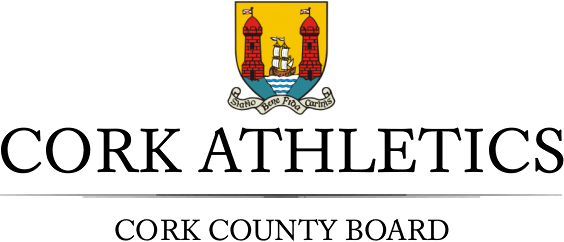Interview with Steve Jones - World Marathon Record Holder
Steve Jones World Marathon Record Holder Interviewed
Fermoy, Co Cork
January 27th 1985
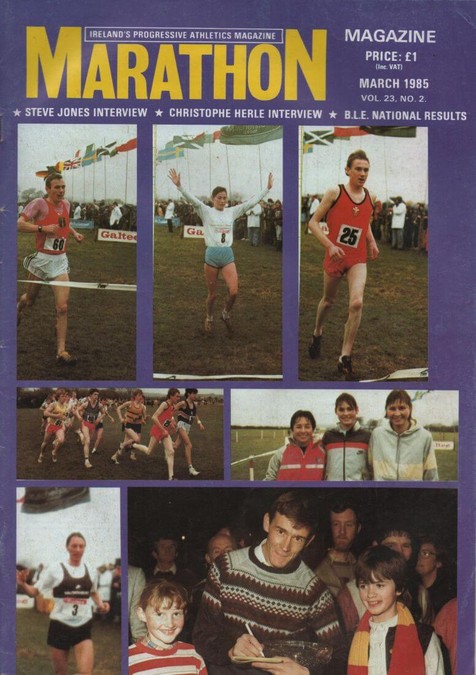
Interview by Fr. Liam Kelleher from Marathon Magazine, March 1985, Vol 23, No 2
LADIES AND GENTLEMEN - INTRODUCING MR STEVE JONES, WORLD MARATHON RECORD HOLDER
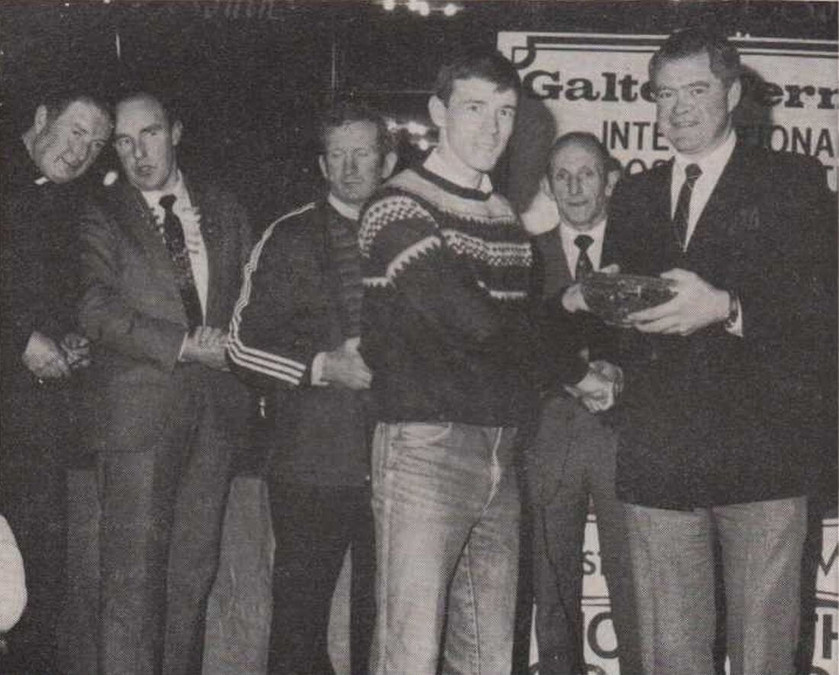
Michael Murphy, Mitchelstown Co-op sponsors presenting Steve Jones with his prize in Fermoy. Included also left to right: Fr. Michael O'Connell, Michael O'Dwyer, U.D.C., Tom Burke, Race organiser, Nelius O'Neill, Chairman, Fermoy and District Harriers A.C.
Fr. Liam: Here we are at the Galtee Cross- Country Race of 1985. We've Steve Jones, the man who really hit the world headlines last October when he won the Chicago Marathon in a world record of 2 hours 8 mins. 5 seconds. Steve, that must have been a real red letter day in your sporting career?
Steve: That's right! It was a great day for me in my athletic career, running career. It was something that I didn't really expect and at the end of the day it was really fantastic.
Steve: I've run 8 World Championships. Yes, 8, and New York has been very successful. I started off in 77 in Dusseldorf and I was 103rd and over the years I've kind of got better and better, in fact, the year after the 103rd I was 11th, so that was in Glasgow.
Fr. Liam: You improved on that in Limerick?
Steve: That's right. Yes, I was the only person that chased after John Treacy when John Treacy made his break in Limerick. I was the only one who went with him and at the end of the day it cost me a better place.
Fr. Liam: On that day you finished... ?
Steve: 7th.
Fr. Liam: Of course, vou had a good road and track record and you have a number of AAA's championships to your credit?
Steve: That's right. I've run in the A.A.A.'s championships several times. I had two seconds, a first and several thirds and fourths. I've won two 10km titles this year - one on the road and one on the track.
Fr. Liam: Steve, big time as I said in the beginning is nothing new to you. You started in which was the first major event for you?
Steve: Well, the first major event was the Welsh Championships in 1976 where I finished 7th. I just failed being selected for the World Cross-Country Championships in Chepstow and that failing selection, be it fair or unfair, has been an inspiration for me to continue running well and to make World Cross-Country Championships. That's where I started my career and it gives me most pleasure.
Fr. Liam: In track races you had the Commonwealth Games of 1978 and you competed of course in the 1982 Commonwealth, in between, what?
Steve: In between it's been A.A.A.'s and World Cross-Country Championships. Everything has been centred in the early days of my career on the Cross-Country Championships.
Fr. Liam: You ran in the 1982 Europeans in Athens and that was a very warm, humid night?
Steve: It'was very warm; not a major breakthrough in my career because outside the Commonwealth Games that was the first major game in which I participated. And the Commonwealth Games are very different to Olympic Games and European races. It's very friendly. The pressure isn't there as is in the major Games.
Fr. Liam: And what is your memory of Athens?
Steve: My memory of Athens was coming up the back straight for the last time.
I looked at the big screen and watched Cova and Schildhauer sprinting ahead, that was my memory and I was thinking to myself that was the first time that Cova had beaten me and he's winning the European Championships and since then he has gone on to win the World Championships and Olympics.
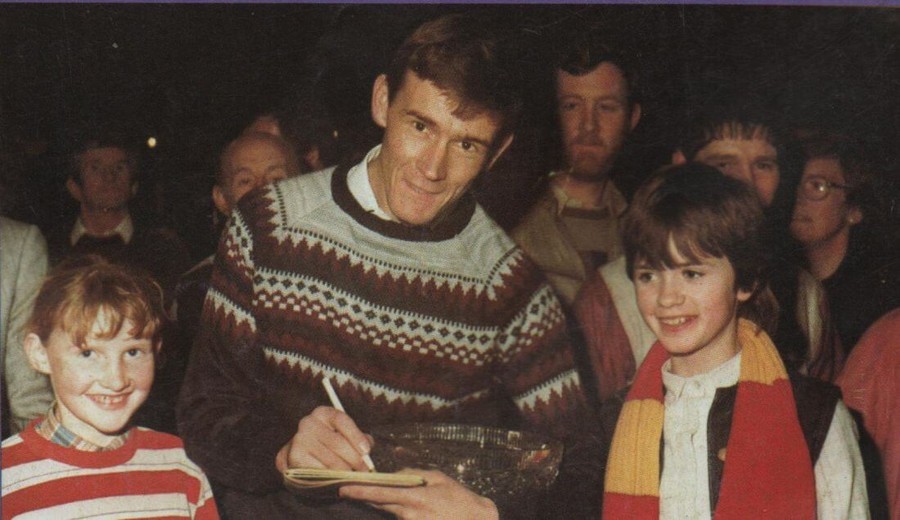
Steve Jones signing autographs
Fr. Liam: And then, of course, you went on to compete in Helsinki in the World Championships in 1983?
Fr. Liam: You went to Los Angeles then in the 10,000m in 1984 for the Olympic Games. Are you satisfied that that was the event you should have picked, in retrospect?
Steve: Yes. you can't go on retrospect. If you did than then the whole world would be — If only. I can't be like that. I prepared far the 10,000m and I went for the 10,000m. As it happens, when I got there I wasn't as prepared as I would have liked to have been. Several things happened to me before I went and one as I Wished second in a trial Then I happened to have another trial after that which you know, wasn't very conducive to running, well, in Los Angeles also, my coach retired from the sport about a month before Los Angeles because of personal and family commitments, so I will be the last person to say it was the wrong time, but when your family is involved I
You can't question that decision. He made the right decision. For seven or eight years I have been led by one person and every decision I have made, every act in running has been made by that one person. To be suddenly on my own is very unnerving. I'm a fully-grown athlete, I'm a man and yet being suddenly on my own is a great responsibility.
Fr. Liam: Then how did you get yourself together, mentally and Physically, before the great effort in Chicago7
Steve:Chicago? Okay, my coach retired from the sport and I had to pull myself together in Los Angeles. I didn't compete as well as I should have, I didn't compete to my full capacity, so I went home, relaxed, started training properly.
I had 6 weeks preparation for Chicago. I went to America and trained at altitude for 6 weeks; 7,000 feet altitude. I trained very hard. I raced 4 or 5 times then went back to altitude, and when I came to Chicago I was very very fit.
Fr. Liam:And what are your memories and how did you see that race developing. Can you briefly tell us how that race developed?
Steve: Yes, my memory of Chicago the morning of the race I jogged out to the start from the hotel with Jerry Kiernan, who was very very friendly to me. We'd known each other for a long time. The weather was raining and windy and very cold and I said to Jerry, a good time is out now. It does not matter. It’s just going to be a race between blokes. Jerry said don’t be too sure, a lot can happen in 26 miles. We warmed up together. We |did a few strides together, and that was the last time I saw Jerry until after the race. The race itself was exciting and all the way there were 10, 12 people together. It was really exciting, when I finished Jerry was one of the first to come and shake hands and say well done!
Fr. Liam: And did you find that you all shared the workload - were more people doing more work than others?
Steve: Well, in a marathon it is very hard to share the workload. I was inexperienced. De Castella, Lopes, they were experienced. Whatever they did was O.K. by me. I just followed along. I didn't sit behind anybody. I did not shelter in the wind, I did not shelter in the rain. If there was somebody in front I was by the side of them. I did not go into the lead and force the pace. I was a 10,000m runner, the marathon runners were in front. They knew exactly what to do and I knew they wanted to go for a fast time or record, whatever, and if it should show Deek picked it up.
Fr. Liam: At what stage did you make your decisive move?
Steve: I was contemplating in making the move at about 18 or 20 miles. We got to 19 miles and somebody in their wisdom, only thinking of the athletes, put a water station there that shouldn't have been there, on the corner of the street. You know, that's the last thing you want at the corner of a street - a water station!
So you turn the corner and there's a water station there and Geoff Smith and Kamel collided. Kamel fell over and I caught Jeff and helped him up and we all carried on to the real water station. So then I thought to myself, it's time I had a move now because we were all getting crowded, we were tripping over each other. That's what I thought. I made a few surges, one or two people responded, one or two people did not. And I did it again and I just said. Right, make a decision, let's go for it, and that’s what I did. I made the decision and I just went
Fr. Liam: And you knew over the last few miles that victory was yours?
Steve: Well, it's very difficult because what with the experience of the people, Lopes, De Castella, they had experience, a lot more than my experience in relative terms. I've raced Lopes a lot of times and I know that if you run against him, Lopes, you haven't won until you have crossed the line.
Fr. Liam: Steve, looking back on your performance and maybe on the performance of John Treacy in finishing 2nd in the Olympic Marathon, is there something in it that you got to race only very lightly in marathons to gain major success?
Steve: I don't know until I do another marathon and find out how I performed. I won't be able to answer that question. Okay, as a 10,000m runner I performed very well on that marathon but reluctant as I am to change my training and to change my attitude, it is changing very slightly, so maybe next time I go into a marathon I'll go in not as a 10,000m runner but as a world marathon record holder.
Maybe it will be a bit tougher next time or maybe even John's will be a bit tougher, so, he had not a marathon before Los Angeles but he was a very very fit person and that's all he need to be to do it. Maybe his attitude to his next marathon, wherever it may be, European '86 or wahtever, it will be slightly different, you know, and the pressure will be on John. Before, the pressure was not on John, but next time it will be.
Fr. Liam: Was it a personal surprise to you to see John gaining a Silver Medal in L.A.?
Steve: No, we ran together. We were in the same heat in the 10,000m in L.A. We were talking to each other. We wanted to run 28.27. If I went in front of John he would say go easier, there is no need to do that. John was very very fit and I realised that and all the people that know John, you know, Nick Rose, myself and the rest of the 10,000m runners, we all realised that John was very fit and if there was anybody in with an outside chance then it was going to be John Treacy and that's what happened.
Fr. Liam: Steve, where do you see your career going at this stage and for the rest of 1985?
Steve: Well, for the rest of 1985 I might do a marathon in April or early Springtime. I'm not quite sure yet, but my next definite marathon will be Chicago in October and I would like to perform as well as I have been in previous years on the track again this Summer and record personal bests for 5,000m and 10,000m.
Fr. Liam: You've been to Cork in 1984, are you hoping to come back for the big year - Cork 800 this year - for the celebration 800 years of Cork?
Steve: Yes, I would hope to. It's very difficult for me because I'm in the Air Force and things aren't very easy for me to negotiate to come to Ireland. But I came last year, and I've been all over the world running Eastern world and the Western world and I've never met such friendly people in all my life and I was really overwhelmed by the friendliness that I met in Cork last year and if for nothing else, that is one of the reasons I want to come back.
Fr. Liam: And did you meet it in Fermoy this week?
Steve: Yes, the weather didn't spoil anything for the people. I had a tremendous amount of people shouting for me on that course today.
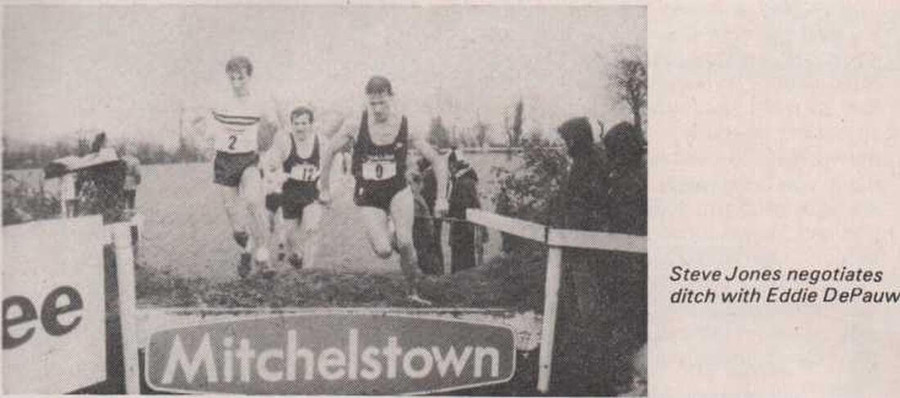
Steve Jones negotiates ditch with Eddie De Pauw
Fr. Liam: Getting back to today's race, what were your views of the event? Christoph Herle was quite an impressive winner.
Steve: Yes, well, he decimated the race. He just took off when he wanted to take off and he didn't look back. He just carried on and carried on. I was a little surprised because Christoph is a strange sort of person. He doesn't usually go like that. He usually sits in behind and when you have a sprint finish! He loves a kick. But I was very impressed with Christoph. The West German, Schneider, was a bit of a surprise. I was disappointed because for over two-thirds of the race I was in front of him and with De Pauw the sat behind me and they just sat on me all the way round. If we could have worked together we might have made a bit of an impression on Maminski and putted him back a bit. But they weren't prepared to do it. I put my head down and kept trying but, anyway, they wouldn't help me.
Fr. Liam: I think it's true to say that the Fermoy event has gained a good reputation internationally?
Steve: Yes, in the past you've had tremendous depth of international crosscountry running. To think De Castella was 4th the last time it was run! For a man of that calibre to finish 4th in any race is a tremendous sort of a lift for any organiser. Well, for anybody! But you've had it again this year. I mean Christoph Herle, Maminski, Schneider, and Eddie De Pauw who won the World Cross- Country championships as a junior in Limerick.
You've got a fantastic depth of international running there and there's not another race in Europe that can boost that sort of depth. It's incredible.
Fr. Liam: Well, thank you, Steve. I think' Liam has some question to ask you at this stage and you've been very informative up to now.
Fr. Liam: What I want to ask you, Steve, there in relation to what you said, your coach for personal reasons which you elaborated on gave up about a month before the Olympics. Could you fill us in on his work with you before that?
Steve: My coach was Bob Wallace and we worked very well together. We'd been together for 8 years, for 7 or 8 years and all of a sudden he had a personal family problem that he had to retire from the sport. Honestly, I don't really want to elaborate any further.
Fr. Liam: There's no need just apart from that. But then you said you had to prepare on your own for the Olympics. Did somebody give you any advice then or since then?
Steve: No. To be honest, basically I just followed my coach's old training sessions. I'm experienced enough to know what should be done, what shouldn' be done. It was just the other thing of the inexperience, of being on my own more than anything else. Okay, I knew what work to do. I knew when to do it, I knew what races to do, where not to do it. But to be for 8 years guided by a person and suddenly find yourself on your own ... !
Fr. Liam: At the eve of the Olympic Games?
Steve: Yes, it is very disconcerting, I suppose.
Fr. Liam: Did you get any advice for the Marathon in Chicago from other people. Who advised you to go to high altitude training. Obviously this was something new in your training?
Steve: It was something regarding my family more than anything else. My agent in America was looking after me and the year before he had recommended that I stay at this place at altitude because there was an apartment available for me and my family and this year I did exactly the same. With regard to preparation for the Marathon in Chicago, I had been in touch with John Treacy over in Boston and he sent me his diet sheets and his preparation sheets and he was a very very good help to me. A great help, although I didn't follow his diets 100% because it was very difficult being out living away from home with my family and we couldn't all eat the same thing, so we used to go out eating.
It was a great help to me and I would follow his advice to the end. He advised me to the best of his ability. He advised me on what he did for Los Angeles and as well as I could I followed it. Also, Charlie Speeding gave me a lot of advice as well so I had two Olympic medallists in the background giving me advice which I found was an invaluable help to me in Chicago.
Fr. Liam: Yes. From listening to you and speaking to you, you're very unassuming and quiet about the whole thing. Does the extra pressure now, because of what you did in Chicago, make life a little bit more unpleasant when people like the likes of me now, maybe, running after you and trying to get interviews for magazines and things like that and other commitments. Is that more difficult or is it something that you don't like or you do like?
Steve: Well, I don't like it. No, there are not many athletes who do like the interviews, the TV interviews and magazine and papers. But you've got to be quick to realise that you are part of a sport and people want to share this part of it with you. They're not busybodies. They're not interfering. They're people who love athletics and people who are athletes and really you owe these people who support you a debt because of what they give you and you owe some explanations to people who follow you and run in your footsteps or whatever to do it. The inter- j views and that sort of thing doesn't affect me at all. It's the presentations and the dinners and the drinks and whatever, they're the things that really get you down at the end. But the things like the interviews, you just share an experience with other people and that's important.
Fr. Liam: I suppose it helps as well to have a good, settled family life. There's a lot of mileage made in the media about the family thing. How many children have you?
Steve: Two boys.
Fr. Liam: Yes. The two boys being with you in Chicago and they watching the cartoons when you were running in the marathon, that's nice as well?
Steve: That's right. My boys watch the cartoons in America even when I'm running in the marathon as well. My wife was switching it back and forth, she would be watching the marathon. But they didn't miss a thing. You know, the kids are very perceptive. If that was on the other side they saw a little bit of Daddy, a little bit of Donald Duck. But you get home and they know I'm pretending to be Steve Jones. You could say to my little son, the youngest one, he's 3 and a half. He said "Ladies and gentlemen. I'm reading out the winner, Mr. Steve Jones". And they never missed a single thing even though they watch the cartoons, everything else they have taken in. They love it.
Fr. Liam: In your home country, in Wales, the Welsh are normally associated with rugby and things like that. Athletics even in Ireland is a kind of second-rate sport in a sense that it's not really a spectator sport except at major championships. Has that struggle motivated you more than anything to reach the top and now that you have reached the top are you accepted in the same level as Barry John or, Gareth Davis or somebody like that?
Steve: Yes, I think I am now. It's been very frustrating over the last 8 years because I've been fairly outstanding in my event in running. Apart from, you know, other athletes in Wales, I’ve been outstanding. I've won this and I've won that. I've competed in this Games and that Games and yet the standard of athletics behind me hasn't risen. You know, any other sport like in basketball, in football, if you've got an outstanding leader, an outstanding person then the standard of the play, the game that's behind you, lifts up, but that had not happened in Wales in the last 8 or 9 years. But now it has. Look, Jones has done this, it's great, there's a resurgence. You saw it with the Junior Dale Rixon winning.
Somebody said to me in work the other day: I read The Echo, the local paper, and they said it's between you and Terry Holmes now who gets the most recognition. You or Terry, while before it was Ian Rush, Terry Holmes, Gareth Edwards or Barry John, but now Steve Jones, an athlete, another sport, is getting on the back page and we're both hogging the paper, you know, and that's what I've done now, not just a record, but everything. It’s all lifting up.
Fr. Liam: Do you ever find training boring or do you train on your own or are there a group of you together?
Steve: I train 95% of the time on my own whenever I can. Before I went to Chicago I trained once a week down in Newport with the Newport Harriers, with the club. I run with Neil Hardy, Neil Norsfield and people like that, James Nill, Roger Greaves and that helped me quite a bit because they are track athletes. I'm not a track athlete, you know. Okay, I've done all the Games but I'm not a track athlete. I'm a blood and guts cross-country runner and road runner. They are track athletes so I do a bit of speed training with them, but 95% of the time It's all on my own. I don't get bored at it, no, because I've got ambitions and I've got targets and they are what I focus on. You can't afford to get bored if you get bored. You lose your way.
Fr. Liam: How did you actually come into the sport and at what age did you take it seriously and how did you get involved in the sport?
Steve: Well, I got involved in the sport with a Cadet Corps at home. It's very much like Sea Cadets. And I started competing as a 15-year-old in three competitions a year. I got a bit of crosscountry and it was great.
Fr. Liam: How did you do at that stage?
Steve: I wasn't very good, you know. I smoked a bit, I drank a bit, I did all the things that kids do and it's great. I don't regret anything because I enjoyed myself as a kid, now I enjoy myself as an adult. But when you're a kid you do things, as you know yourself, that really are not good for you but you do enjoy them. But I wouldn't say to anybody, go out and do that or go out and do this, because some of the things you do are wrong, but I enjoyed it. I don't regret anything I've done.
Fr. Liam: And at what stage then did you realise you had potential and you started to win races, at what age?
Steve: Potential I trained hard for. I trained for a year or two but I joined the Air Force. As a 20-year-old I entered the Welsh Championships in 1976, I finished 7th, the Championships were in Cardiff and the World Championships were in Chepstow. I finished 7th. I didn't get picked for the Welsh team. I couldn't believe it.
Fr. Liam: You said that, yes.
Steve: So I said right. I said to the manager that from now on you have to pick me and since then that has been that way. The initial motivation from then on was you have to be picked, and I've done it from there.
Fr. Liam: What do you enjoy most about the sport of athletics? I know it's a loner event. I know most people think that. What do you enjoy most about the sport?
Steve: I enjoy everything about it. I enjoy the training because it's hard and its character building. I enjoy the self- motivation I achieve out of it.
I enjoy meeting people. I enjoy travelling to countries, different countries, to compete. Okay, some countries you can't speak the language and there are different barriers between you and other athletes. But what I enjoy immensely now is to watch people from my country, from Wales, performing even better. Dale Rixon winning to-day, that was, great, and Wendy Ore, she finished 6th in the ladies'. You don't get people like that very often from Wales.
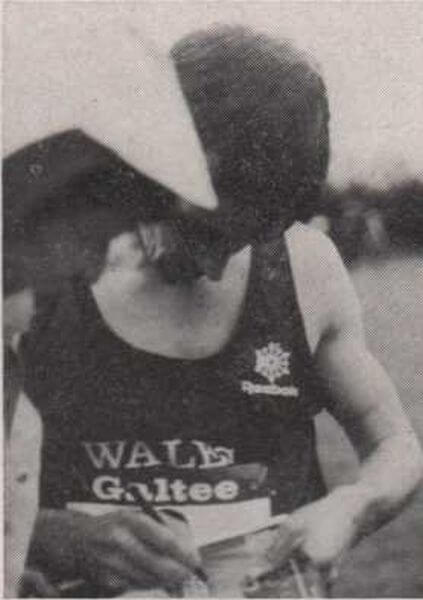 Steve Jones signing autographs up to 2 minutes before his race
Steve Jones signing autographs up to 2 minutes before his race
We're not a running community. We're not a running country. The national sport is other sport. It's great to see, it's great to come away with these people and enjoy yourself.
Fr. Liam: Do you think that there will be a bigger clampdown, which obviously there will be, after Los Angeles on the medical side of the thing, the drug thing - what would your comments be on that?
Steve: I don't know whether you want to print my comments or not?
Fr. Liam: Yes. I'd like to.
Steve: If people want to take drugs then that's up to them. You know, I really honestly think that because it doesn't take anything away from me. I know myself I don't take anything. I don't take any drugs. I take the odd vitamin here, the odd vitamin there, like any athlete does, whether at the top of the scale or the bottom of the scale. I take the vitamin pills but I don't take anything else and when I go away from a track race and run 27.39 or if I come away from a World Cross-Country and finish 3rd or even break a world record - I've done it because of the hard work I've put in. What anybody else wants to do that's entirely up to them.
Fr. Liam: But you don't obviously approve of that?
Steve: No, I don't approve of it. I don't approve of it at all. I think it's terrible that people should have to do it but what's the point in banning them, in hav- running community. The national sport is other sport. It's great to see, it's great to come away with these people and enjoy yourself.
Fr. Liam: I think that's a fair comment. Maybe a question which might be of value to me because I have a very keen interest on the younger people, again to encourage them. You're going to give them tremendous encouragement. What is your main advice to younger athletes growing up?
Steve:Well, ever since I've been running I've set little targets for rhyself. They've not been easy targets, but they've not been targets that are away out. Now when I was 18 years old I didn't say to myself I'm going to break a world record, I did not say to myself I'm going to beat the guy next door. I set reasonable little targets for myself and those are little targets that you've got to aim for and when you reach that target set another little target, another ambition and when you reach that set another ambition and you'll find that all throughout your career. You should have a gradual incline on your standard of running, standard of performance.
Fr. Liam: Obviously, by what you've done in Chicago you know you established what we call immortality. You'll be remembered forever by people who are involved in athletics. Is there any final ambition or your overall ambition. Is the one thing that you would like more than anything else to achieve in athletics?
Steve: I don't really think there is. I just want to fulfil my little ambitions. You know, run a personal best on the track andIor finish 2nd in a World Cross-Country Championship or even break the world record again. As long as I improve at the same rate as I have done over the last few years and I would be very pleased if I can move with the times, I’ll be very pleased. I don't set ridiculous ambitions and I don't set easy ambitions as long as I can stay within my own little group of ambitions I will be okay.
Fr. Liam: Coming up over the next three years after this year you have the Europeans, you've the World's and you've the Olympics. Are they in the back of your mind or it's not the end of the world if you don' achieve any of those things in the track, gold medals in any of those events?
Steve: No. I've said in interviews before, the people like Sebastian Coe's, Steve Ovett’s and maybe Eamon's and John Treacy’s, gold medals, that's all they want. Gold medals or silver medals or bronze medals. But that's not what the sport is about. The sport is about everybody. If you can just achieve, if you can go to these races and do a personal best then you've achieved something. My ambitions aren't to win gold medals or win any medals, my ambitions are to enjoy my sport to enjoy the company I’m with and to run as well as I ever have run.
Fr. Liam: Fantastic note to end on, Steve. Thank you.
Steve: Thank you very much.
Related Articles
Galtee Grange International Cross-Country Results - January 1985
Interview with Christophe Herle Winner of Galtee Grange International Cross-Country 1985
Grange International Cross-Country of 1980 Recalled 40 Years On - Guest Article by John Walshe
Tom Burke Honoured at Cork Athletics International Awards 2020
Tom Burke Hall of Fame Induction
Tom Burke Interview at International Awards 2020
FERMOY'S DECADE OF RACING GLORY - Guest Article by John Walshe
